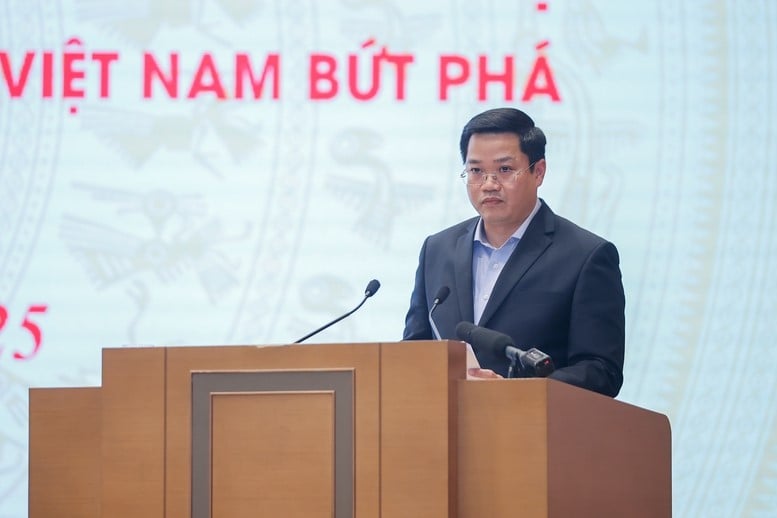 |
| Deputy Minister Nguyen Duc Tam speaks at the conference. Photo: Chinhphu.vn |
With the theme "Constructive State, Vietnamese SMEs Breakthrough in the New Era", the Conference was held under the chairmanship of Prime Minister Pham Minh Chinh. Attending the Conference were Permanent Deputy Prime Minister Nguyen Hoa Binh and Deputy Prime Ministers: Nguyen Chi Dung, Tran Hong Ha, Ho Duc Phoc, Bui Thanh Son, Mai Van Chinh.
Deputy Minister Nguyen Duc Tam said that in recent times, the business community and the business community have always received attention and high appreciation from the Party and the State, including SMEs. It can be said that this is the main production force of the economy , playing a very important role in the cause of building and developing the country. After nearly 40 years of Renovation, SMEs have grown strongly in both quantity and quality. To date, Vietnamese SMEs account for nearly 98% of the total of more than 940 thousand operating enterprises.
SMEs play an important role in creating jobs, reducing poverty, improving workers' income, contributing to the state budget and economic growth. At the same time, they are the main force exploiting niche markets, mobilizing maximum resources from the people to serve economic and social development. Even in difficult times, SMEs still strive to maintain production and business activities, demonstrating social responsibility to the community; being the source of innovation in business and a bridge to bring scientific and technological research results into practical life.
In 2024, SMEs will continue to have positive developments, making important contributions to the economy. Our country's GDP in 2024 is estimated to increase by 7.09%, of which the industrial and construction sector, where most SMEs are concentrated, will increase by 8.24%, contributing over 45% to the total added value of the economy. SMEs in the service sector also recorded strong growth. The added value of the service sector in 2024 will reach 7.38%, higher than the 6.9% increase in 2023.
In particular, the wholesale, retail, transportation, warehousing, finance, banking and insurance sectors all recorded impressive growth, with significant contributions from the SME sector. In addition, SMEs in the agriculture, forestry and fishery sectors also maintained stable growth, with added value reaching 3.27% in 2024. This shows the recovery and sustainable development of SMEs in the context of many fluctuations in the global economy.
Over the years, our Party and State have always paid attention to, encouraged, and allocated priority resources for the development of SMEs. In 2017, for the first time, the National Assembly issued the Law on Support for SMEs with comprehensive groups of tasks and solutions to support businesses such as: access to credit and finance; tax and accounting support; support for production premises; technology support; innovation; support for market expansion; information, consultation, legal, human resource development... These policies demonstrate the timely attention of all levels and sectors, helping the SME community restore and increase confidence, increase investment, and expand production and business.
Besides the above positive results, the business community in general, especially SMEs, still face many difficulties and challenges, and many barriers and limitations to substantial and sustainable development.
On the supply side, the agricultural, service and tourism sectors face rising production costs. Industrial production depends on the recovery of the world economy, new industries and fields such as digital economy, green economy, chips, semiconductors, AI... although improved, have not had clear changes, and are at risk of not being able to catch up with the world and the region without breakthrough mechanisms and policies.
On the demand side, investment recovery is slow. Domestic purchasing power growth is low. Enterprises continue to face increased competitive pressure in both the global and domestic markets, the risk of being sued for trade defense, anti-dumping duties, and must respond more quickly to new export market standards.
In addition, macroeconomic stability still has potential risks, especially from external factors. The average CPI growth rate has shown signs of decreasing, but inflationary pressure continues to need to be closely monitored. Credit growth is not high; the capital absorption capacity of the economy and enterprises is still weak.
Not only that, we have not yet thoroughly and promptly resolved the difficulties, obstacles and inadequacies in institutions and laws to suit the reality and development requirements. Decentralization, delegation of power, reduction of some regulations, administrative procedures, standards, technical regulations and business conditions have not been thorough. Some ministries, branches and localities have not been really resolute and proactive in accompanying businesses to resolve and remove difficulties.
On the other hand, the development process of our country's SME team is still young compared to other countries in the region and the world, and has not accumulated much in terms of capital, knowledge, technology and business experience. The scale of enterprises is small, the capital is small (over 90% have a scale of less than 10 billion VND), the technology is still backward, the management level is not high, not professional, the capacity to mobilize and absorb capital is low. In 2024, outstanding credit for SMEs will only reach nearly 17.6%. Most SMEs operate in a fragmented manner, focusing mainly on the field of trade and services. The proportion of enterprises participating in the manufacturing sector is very limited.
Furthermore, competitiveness, application of science and technology and innovation, green transformation and digital transformation are only concentrated in a few medium and large-sized enterprises. Most SMEs do not have original technology and do not have enough potential to digitalize and green their business activities. Corporate governance innovation is still slow, not approaching good international principles and practices, and not meeting the requirements of being the core force of the country's economy.
In addition, most SMEs have not been able to participate in export activities and regional and global value chains. Linkages between domestic enterprises and FDI enterprises are very limited, which hinders the process of technology transfer between FDI enterprises and domestic enterprises.
Although the Government pays attention to supporting SMEs, its implementation in practice still faces many difficulties and obstacles, and the level of policy absorption by enterprises is still limited.
Deputy Minister Nguyen Duc Tam emphasized that the world is witnessing many major changes such as the emergence of new industries; policy changes of major economies leading to shifts in investment flows; adjustments in trade structures, increased tariff barriers; especially the risk of a global "trade war" that is present. This poses risks and challenges but at the same time brings new opportunities and fortunes to countries and businesses.
The year 2025 is of special importance to the country. This is the final year of implementing the 5-year Socio-Economic Development Plan 2021-2025, the year of acceleration, breakthrough, and reaching the finish line. With the perspective of breakthrough development, proactively deciding the future, using development to maintain stability, stability to promote development, our country has determined that the growth target for 2025 must reach 8% or more, creating a solid foundation for double-digit growth from 2026 to realize the aspiration and vision of the New Development Era and the strategic goal by 2030, our country will become a developing country with modern industry, high average income and by 2045, it must become a developed country, high income. To achieve double-digit growth, the non-state economic sector, including the important role of SMEs, needs to increase by about 11%/year.
Faced with new development requirements, the business community in general and the small and medium enterprises (SMEs) in particular need to further promote their role and mission in the country's socio-economic development. With the motto "The Party leads, the National Assembly decides, the Government directs, and localities implement," to promote small and medium enterprises to make breakthroughs in the new era, Deputy Minister Nguyen Duc Tam has proposed a number of specific orientations and solutions.
For ministries, branches and localities: With the spirit of "constructive State", meaning that the State must perform well its role in creating an investment and business environment, building favorable, transparent, fair, stable and predictable policies and institutions, creating trust for businesses, ministries, branches and localities need to:
Firstly, unifying the awareness of the particularly important role of enterprises in general, and SMEs in particular, in socio-economic development. Identifying enterprises as the pioneering force, directly creating material wealth for society, and an important driving force to promote economic growth, in which the private economic sector is the most important driving force.
Second, focus on perfecting institutions and laws, identifying institutions as "breakthroughs of breakthroughs", creating all conditions for people and businesses to enter and withdraw from the market, and access production and business resources. Innovate the thinking of law-making in the direction of "development creation", abandon the thinking of "if you can't manage, then ban"; promote the method of "management by output results"; strongly shift from "pre-inspection" to "post-inspection" associated with strengthening inspection and supervision. Strictly implement the principle that people and businesses are allowed to do what is not prohibited by law, create trust and positive social psychology to mobilize all resources in the people to production, business, and economic development, so that every person can easily start a business when needed.
Third, focus on administrative reform, quickly resolve investment procedures, remove difficulties and obstacles for businesses and projects. Promote the development of e-Government and digital Government to help businesses access information and public services conveniently and quickly, contributing to improving the level of trust in the business environment and the state management apparatus.
Fourth, promote the implementation of Resolution No. 57-NQ/TW of the Central Committee and Resolution No. 03/NQ-CP of the Government; promptly issue documents guiding new, breakthrough policies that have been approved by the National Assembly for piloting on investment, finance, bidding, controlled testing, fund mechanisms, venture capital, science and technology funds and commercialization of business research results... to remove bottlenecks, difficulties and obstacles in science and technology activities and innovation.
Fifth, continue to promote the implementation of the Law on Support for SMEs, effectively using state budget capital. Continue to promote and innovate communication work on policies to support SMEs to the business community. Support businesses to effectively exploit opportunities from 17 signed FTAs; expand and diversify export markets, especially countries that have recently upgraded their strategic and comprehensive strategic partnerships with Vietnam; quickly negotiate and conclude FTA negotiations with Middle Eastern countries, Switzerland, Norway, Finland... and increase exploitation of new, potential markets, Middle Eastern, Halal, Latin American, and African markets.
Sixth, promote the implementation of programs and solutions to support innovative enterprises, promote digital transformation, especially inclusive digital transformation, "dual transformation". Support the upgrading of SMEs to meet the standards of association with large enterprises, leading enterprises, and FDI enterprises.
Seventh, urgently develop and submit to the Central Government for promulgation a new Resolution on private economic development, in which the core is enterprises (including small and medium enterprises and large enterprises), identifying breakthrough solutions to develop the private economy into one of the most important driving forces for growth, increasing labor productivity and competitiveness of the economy.
For the business community and SMEs: Faced with new development requirements, the business community in general, of which over 97% are SMEs, needs to make greater efforts, be more determined, and take more drastic actions to promote its role and responsibility in socio-economic development, pioneering in innovation, applying science and technology, focusing on traditional growth drivers, promoting new growth drivers such as: digital economy, green economy, circular economy, knowledge economy, sharing economy, and combating climate change.
SMEs need to closely follow market developments to proactively adapt, adjust production and business plans, and cut operating costs. Make the most of the 17 Free Trade Agreements that Vietnam has signed, especially new-generation Free Trade Agreements to diversify export markets and alternative supply sources.
Increase investment and application of information technology; digital transformation, green transformation in operations, production and business; improve quality and level of corporate governance; perfect production processes, improve product quality to meet the standards of participating in the supply chain of large enterprises and FDI enterprises. Actively learn and participate in support programs of the state and international organizations to improve capacity.
Continue to promote the national spirit, unite strength to build the Vietnamese brand in the international market; uphold the spirit of cooperation, connect with each other towards common values and benefits; strengthen responsibility to the community, society, the nation and people; continue to do a good job of ensuring social security, actively implement the elimination of temporary houses, dilapidated houses, social housing, be ready to support people when facing difficulties, overcome natural disasters, storms, floods, epidemics...
Continuously improve the capacity, quality, and quality of human resources, leadership, management, and corporate governance, as well as develop corporate culture, and build a team of entrepreneurs with enough talent, heart, and reach. Continuously learn, proactively equip yourself with knowledge, conditions, and courage to improve competitiveness and reach regional and international levels.
On the part of business associations: Associations need to strengthen the connection between member enterprises, domestic and foreign enterprises, and cooperate for mutual development. Focus on promoting domestic and foreign trade promotion through gathering members who are large manufacturers and exporters in each industry. Along with that, promote the role of representing member enterprises in policy advocacy, protecting members' rights in disputes. Coordinate closely with central and local business support agencies to effectively develop and implement programs, policies, and solutions to support businesses.
Deputy Minister Nguyen Duc Tam believes that with all the attention of the Government, the Prime Minister and the entire political system, the consensus and joint efforts of enterprises, the business community and Vietnamese entrepreneurs will increasingly develop strongly, affirming an even more important position and role in the country's socio-economic development./.
Source: https://www.mpi.gov.vn/portal/Pages/2025-2-27/Tang-cuong-lien-ket-giua-cac-doanh-nghiep-hoi-vienwjhabo.aspx























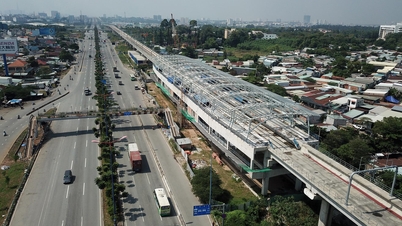

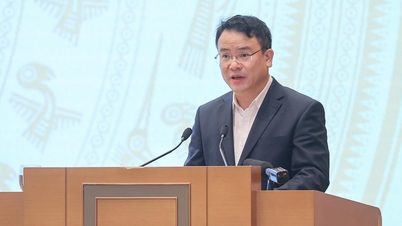





















































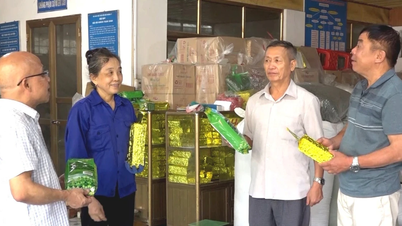















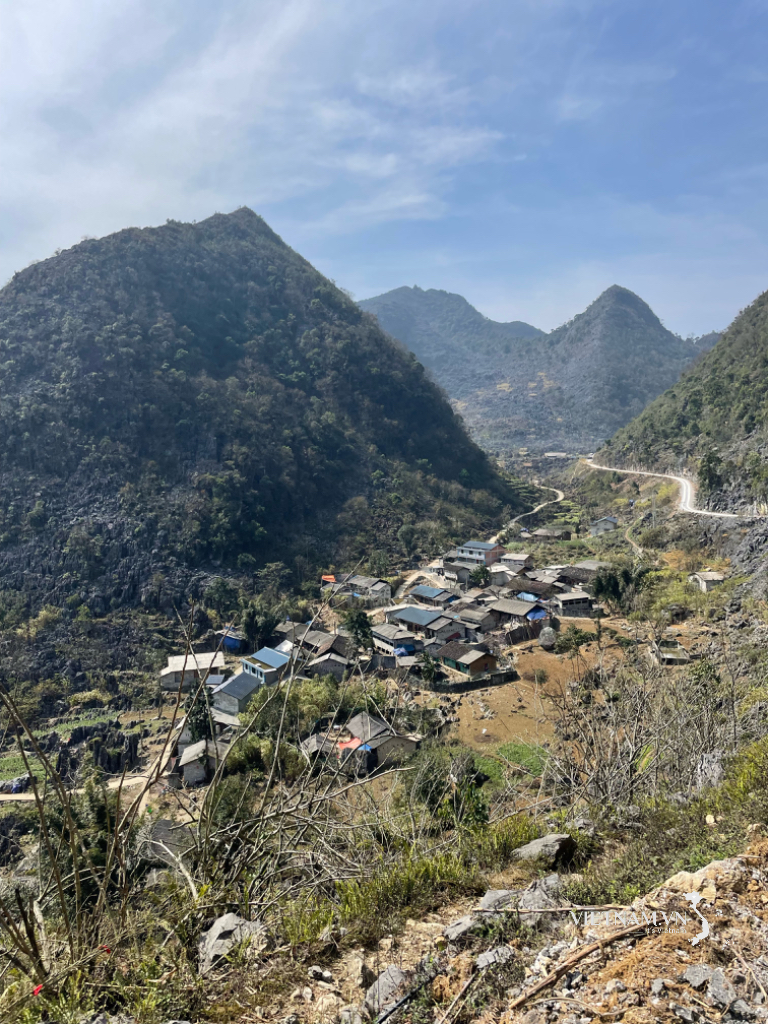


Comment (0)